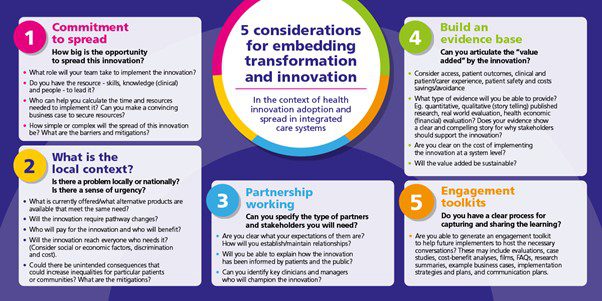In this blog, East Midlands AHSN (EMAHSN) Managing Director Nicole McGlennon discusses the considerations of embedding change, how can healthcare systems create the conditions for healthcare innovation adoption and identifies five key areas NHS systems can consider.
In recognition of October also being ADHD awareness month, Nicole refers to our Focus ADHD project and how AHSNs have played a part in supporting young people across the country to receive an objective diagnosis for ADHD.
Since its inception in 2013, Academic Health Science Networks (AHSNs) have harnessed significant expertise in the approaches and challenges to the adoption and spread of innovation. This was highlighted in an in depth study in 2021 published by the AHSN network which closely examined the approaches and conditions for innovation spread in the health and care sector.
From this and drawing on experience from our EMAHSN portfolio, we know that there is no single approach to getting healthcare innovation spread in the NHS and that success depends on several factors such as the complexity of the intervention, the system and the culture and circumstances of the environment.
As part of our work, we have many strong examples in the EMAHSN and The AHSN Network which demonstrate the adoption and spread of innovation in the healthcare sector. One, in particular, I would like to highlight is our Focus ADHD project which has been adopted by 65 trusts (approx. 63% of all trusts that provide ADHD assessments) supporting nearly 75,000 children and young people to receive an objective diagnosis for ADHD since 2017.
The role of technology and supporting change
COVID-19 has significantly impacted how NHS services are provided and the use of technology.
The Health Foundation puts this well “Whilst there is a wealth of opportunities to help the NHS meet rising demand through innovation and technology it is important to see them as enablers of change.”
Making change happen and making it stick takes time, AHSNs have a commitment to support the implementation of innovation for the benefit of patients and we understand that we can’t allow ourselves to keep doing the ‘same old things.’ Understanding the needs of the populations we serve is key to this.
Change can often interrupt the ‘status quo’ and the mindset of this is ‘how we do things around here.’ In our experience, AHSNs understand that we have to make disruptive change in order to see real benefits. Famous professor of leadership John Kotter identified 8 steps for successful implementation of organisational change, which are transferable across any sector and are hugely adaptable.
Looking specifically at the NHS another important part of the argument for change and innovation is government-proposed legislation that places greater responsibility on Integrated Care Systems (ICSs) to ensure research, improvement and innovation are prioritised.
Taking this into account, the Focus ADHD project began in the East Midlands as a demonstrator project in 2017, following research from the ARC East Midlands. This looked at integrating QbTest, an approved computer-supported objective test which measures attention, motor activity and impulsivity – the core symptoms of ADHD as part of the diagnosis pathway. Data suggests that many young people can wait over two years to be seen in a hospital setting and then an additional 18 months to be given a diagnostic decision (pre-COVID). This can vary significantly depending upon where you live in the country.
Armed with the need for the intervention alongside the evidence base we took great strides in upskilling the AHSN workforce to host the necessary conversations in their systems – bringing together clinicians, managers, patients, commissioners, the product supplier, educational leads, and the charity sector to ask the key questions – two of which we believe to be core – “what’s broken in your system” and thinking specifically about the implementation of the innovation – “why not”? We weren’t naïve, no matter how easy any innovation is to implement and how persuasive the evidence is, scaling up can be challenging. This project is now a national programme supported by AHSNs across the country.
Steps to embed change and innovation
This is just one example illustrating how technology and innovation can be beneficial. Linked to this and our experience, we have developed five steps to consider having the best chance of healthcare innovation adoption and spread in the NHS and ICSs.
This is useful if you don’t know where to start and what to consider, we would recommend using the questions to spark discussion and debate within your team.

How can AHSNs support the NHS and ICSs?
AHSNs have specialist expertise in understanding the conditions for healthcare innovation adoption and spread – but more importantly, have supported projects that have been sustained and contributed to new ways of working for the health and care system. We operate across all of our ICSs and welcome opportunities to support the adoption of transformative technologies and processes that address local challenges. We offer a horizon scanning service which provides access to innovation pipelines of all the AHSNs across England where we can match evidenced solutions to local challenges and embed an innovation culture. EMAHSN has also launched an Innovation Academy a programme designed for those who want a better understanding of how the NHS takes forward new innovations. Contact your local AHSN for advice or if you are based in the East Midlands, contact us at emahsn@nottingham.ac.uk and we can discuss your needs and the support you require.

There is a wealth of HealthTech innovators poised to help solve some of the NHS’ greatest challenges, yet getting a product or new technology adopted at scale in the NHS is far from straightforward. In a recent ABHI member’s survey*, procurement was cited as one of the biggest barriers that innovators face, particularly those from [...]

Tellmi is a social enterprise innovation which aims to address the growing demand for mental health services and tackle health inequalities for young people. It is a digital peer support app available launched in 2017 by psychologist Suzi Godson PhD and engineer Kerstyn Comley PhD. Kersytn explains how Tellmi works. Tell us about the innovation. [...]

The NHS is facing record demand for services. According to The Health Foundation, the NHS waiting list for elective treatment in England has almost tripled in size over the last decade to 7.7 million. And latest figures show there were a record 2.35 million attendances at A&E across England in March this year. We know [...]







